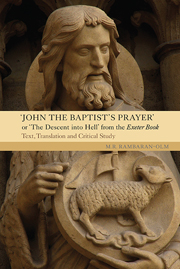 John the Baptist's Prayer 'The Descent into Hell' from the Exeter Book
John the Baptist's Prayer 'The Descent into Hell' from the Exeter Book Book contents
- Frontmatter
- Contents
- Illustrations
- Acknowledgements
- Abbreviations
- Dedication
- Introduction
- 1 Palaeography, Codicology and Language
- 2 The Descensus Motif
- 3 Literary Analysis
- 4 Selected Comparative Studies and Analogous Literature
- Afterword
- Text and Translation
- Commentary
- Appendix 1 The Doctrine of the Descensus according to Post-Apostolic and Medieval Commentators from the First Century to the End of the Eleventh Century
- Appendix 2 Scriptural References
- Appendix 3 Other Sources and Analogues
- Appendix 4 Transcription and Images of fol. 120r
- Glossary
- Biblioigraphy
- Index
Appendix 3 - Other Sources and Analogues
Published online by Cambridge University Press: 05 August 2014
- Frontmatter
- Contents
- Illustrations
- Acknowledgements
- Abbreviations
- Dedication
- Introduction
- 1 Palaeography, Codicology and Language
- 2 The Descensus Motif
- 3 Literary Analysis
- 4 Selected Comparative Studies and Analogous Literature
- Afterword
- Text and Translation
- Commentary
- Appendix 1 The Doctrine of the Descensus according to Post-Apostolic and Medieval Commentators from the First Century to the End of the Eleventh Century
- Appendix 2 Scriptural References
- Appendix 3 Other Sources and Analogues
- Appendix 4 Transcription and Images of fol. 120r
- Glossary
- Biblioigraphy
- Index
Summary
1 ff. Although the doctrine of the descensus arguably lacks any explicit scriptural references, the apocryphal Gospel of Nicodemus and the Apostle's and (pseudo-) Athanasian Creeds provide the keys to its development, and no doubt the poet would have been acquainted with some form of the narrative to include it as the backdrop for the overriding theme of baptism. See Appendix I for patristic Commentary on the descensus. (Source)
1–16 Conner (1980), pp. 181–3, identifies the liturgical Vespere autem antiphon for Holy Saturday, which is repeated before and after the Magnificat, as a likely immediate source. The prologue's repetition of the women's journey recalls a liturgical echo found in the Mass and divine office. (Source)
18–23 The lines are reminiscent of the Quem quaeritis trope in the Regularis Concordia in which the sorrowful women arrive to an open tomb and are shown the shroud. (Source)
20b Muir (2000), p. 682, states that folde beofode is an exact translation of the Offertory Antiphon for Easter Sunday. (Source)
37–9 Crotty (1939), pp. 355–6, contends that the lines allude to an obscure fourth-century Syrian homily denoting a legendary tale involving John's receipt of armour. (Source)
42b Wræccan þrungon] The image of a throng of people (here the righteous Patriarchs and Prophets in Hell) scrambling over one another to see if they can get a glimpse of the approaching Saviour has a close structural parallel in Christ I, lines 397–9, where a throng of angels similarly scrambles to see which one can get closest to Christ. (Analogue)
59a The liturgical Deo gratias line is represented here. (Source)
- Type
- Chapter
- Information
- John the Baptist's Prayer 'The Descent into Hell' from the Exeter BookText, Translation and Critical Study, pp. 200 - 201Publisher: Boydell & BrewerPrint publication year: 2014


